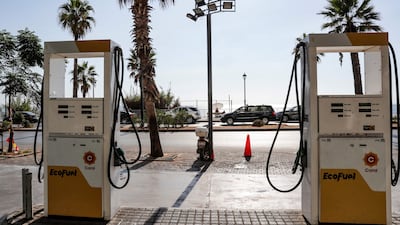The fuel shortages resulting from Lebanon’s two-year economic crisis came to a head last March.
Lebanese motorists sleep outside petrol stations in the hope of buying less than half a tank of fuel. Fights erupt regularly as tension runs high.
The country’s struggling state-run power stations, which mainly rely on fuel oil, can produce only a few hours of electricity a day. The rest of the time, people turn to private generators, but there is rarely enough diesel to run them.
Most of Beirut has had no power at night since earlier this summer. Businesses and hospitals have had to close or reduce operations.
The main reason for the shortages is that Lebanon’s central bank restricts imports of subsidised fuel because it is running out of money.
Fuel importers and petrol station owners say the central bank limits imports to two ships a month. They accuse it of being deliberately slow to approve lines of credit.
Fuel-laden ships wait – sometimes for days – at Beirut port before being able to discharge.
The bank and energy ministry have repeatedly ignored The National’s requests for clarifications.
researcher at the American University of Beirut
The strategy adopted by the central bank has been to gradually lift subsidies over the past year. It is expected that those on petrol prices will soon be removed.
There are no more subsidies on diesel since last week, and it is currently sold at $540 a tonne, said Marc Ayoub, an energy policy researcher at the American University of Beirut’s Issam Fares Institute for Public Policy and International Affairs.
“This is the first time the Lebanese government is pricing a commodity in US dollars,” he told The National.
Another reason for shortages is hoarding by private businesses or individuals to sell at a higher price on the black market or smuggle to neighbouring Syria, where fuel is more expensive and also scarce.
In August, the Lebanese army was deployed to fight illegal fuel sales. It announced the seizure of several hundred thousand tonnes of fuel and diesel, some of which was distributed to locals people and businesses.
But such operations wound down this month. When contacted by The National, the army declined to provide an explanation.
Figures shared by an importer show that imports have not drastically decreased since the beginning of the crisis in 2019, suggesting that fuel exists but is unavailable to the public.
Between January and July this year, purchases of petrol by the private sector were 15 per cent lower than during the same period in 2019. Government purchases of fuel and diesel for power stations dropped by 24 per cent.
The importer blamed smuggling to Syria, a sharp increase in demand for diesel to power private generators caused by the collapse of the state-run grid and the general disruption of the market, which destabilised supply and demand.
But Mr Ayoub accused importers of hoarding the fuel to sell at higher prices when subsidies are lifted. He described Lebanon’s small group of importers as a “cartel” working hand in hand with corrupt politicians.
“If you don’t find fuel in a station, how come you can call someone to bring you gallons which cost twice the official price? The commodity is available in the reserves of some of those importers and stations,” he said.
The importer rejected such a claim, pointing out that oil depots belonging to importers are under the control of Lebanese customs.
“It is hard to manipulate official records published and shared on a daily basis with several public authorities including the energy and finance ministry,” they said.
The government has not presented a clear plan to lift subsidies. But once this happens, prices should, in theory, adjust to the market, ending shortages. Fuel importers will no longer have go through the central bank.
Demand is expected to decrease as prices soar and fuel becomes unavailable to large parts of the population. Nearly 80 per cent of the country is living in poverty, compared with fewer than one third pre-crisis, according to the UN.
Politicians have yet to come up with a solution, despite talking about targeted cash cards for months.








